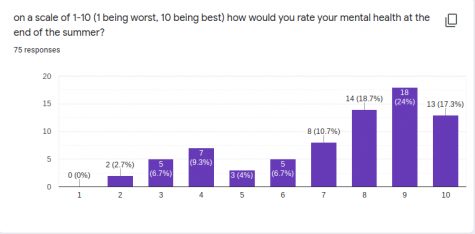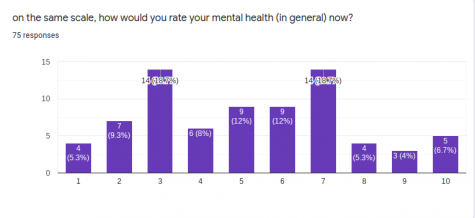How Well Are the Students Doing? A Decline in Mental Health
Mental health: once a rare, taboo topic in the past, compared to its newfound spotlight in serious conversations today. What is it? How can it be affected? And how do you care for it?
Mental health is “a person’s condition in regard to their psychological and emotional well-being.” Various things can affect such a condition, whether it is a bad week or a more serious problem leading to dangerous waters. Lately, with everything happening around us, various platforms have blared the dangers many may face in regards to their mental health, especially among the youth. The big question is: how true do those warnings actually ring? Pretty seriously, to the surprise of many.
In a survey done of 75 people, grades 9-12, students were asked various questions in regard to their mental health. Surveyors were asked to rate their mental health on a scale from 1 to 10– 1 being the worst and 10 being the best. They were asked to rate their mental health at the end of the summer. The most commonly chosen value was 9, with total responses ranging between 2 and 10. Not a single student picked 1, which is a fantastic thing. Until we reach the second question. (left: summer, right: present)


On the same scale, students were asked to rate their mental health now, as in the week of November 9, 2020. A time of coronavirus anxieties, online school stress, and 8-month lockdown frustration, boiling together to create a nasty combination. The highest chosen values being both 3 and 7. There were students who said their mental health was at a 1. As of right now, there are students out there, whether you know them or not, who feel so absolutely miserable that they have hit rock bottom– a dangerous place to be.
It should be noted that this change in mental health can be caused by so many different things– so the third question in the survey asked the students what caused the change if there was one. The top answers were coronavirus anxieties, relationships, and most of all: school. As a multiple-choice question, surveyors, respectively, resulted in 30.7%, 42.7%, and 82.7%, with personally added reasons written in as the optional choice from a small group of others. These are the main causes of such a drop in mental health. With this information, it could be hoped that change may occur to help those we love.
Finally, the last question: Is there anything you wish your teachers, parents, or friends knew? If they were uncomfortable, surveyors were asked to write in “prefer not to say,” which was acted upon by a few. The other responses will break your heart– they brought tears to my eyes sometimes, knowing there are young adults out there feeling this way. As there are 75 responses, with some very personal, not all will be shared. But friends, parents, faculty: know there are things that your beloved kids wish you would understand. Most of the responses were about our schoolwork. Many said that teachers were assigning too much to the point of being extremely overwhelmed. Others wish their teachers understood when they had late assignments, and wished they knew how hard it can be to get everything done. I know a large group of people personally who are doing schoolwork from sunup to sundown, even longer. Such a tireless schedule can cause negative effects, as proven by one of many responses professing that “The schoolwork is too much and I don’t have time to be happy anymore.”
Other responses found to occur in a pattern were the wishes that fellow peers would remain home– some talked about wishing they could see their grandparents, or being frustrated that our lives are shutting down once again because of others’ decisions.
It is very shocking to see what some will say when the answers are left anonymously; there is a very good chance nothing would have been filled in for this question if names were asked after. Instead, the results are horrible in their sincerity– “Just because I look happy all the time doesn’t mean I don’t struggle with depression. I might not show noticeable signs, but I still am struggling.” It is my hope that you take those two sentences with you, and remember them the next time someone tells you they are okay and you automatically believe them.
The next step is figuring out how to fix this decline in mental health–there are many options that would involve various parties, but something must be done. Because if it wasn’t already bad enough before 2020, this year has left too many kids feeling alone, and answering a survey’s questions with “I wish people would realize that I need help.”
